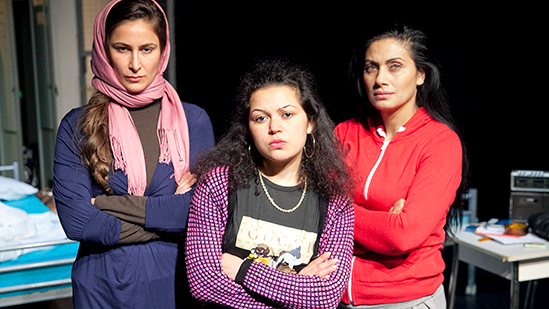Trigger warning: racism, police brutality, suicide, and family death.
This fall, HowlRound Theatre Commons is livestreaming the Roma Theatre Retrospective 2021 in partnership with Independent Theater Hungary. The project shares twenty performances and interviews that are livestreamed twice, presenting the work of 70 Romani artists in ten countries. The performances included in the project initially featured in one of the previous editions of the Roma Heroes International Theater Festival in Budapest which has been presented annually by Independent Theater Hungary since 2017; it is the only international Roma theater event. Working to breakdown racism and social barriers, the festival works to change narratives about Roma people who make up the largest ethnic minority in Europe at about 12 million people. The performances are livestreamed via this page on HowlRound and the next round of livestreams will run from next week starting on November 29 to December 10. Below are reviews of only a small selection of the shows.
Heroes from the Romano Svato Theatre Company based in Vienna presents a play about three women waiting in pre-trial detention to be assessed for asylum in Austria. The play presents an Iranian woman, a Syrian woman, and a Roma woman from Kosovo navigating prejudices, fears, and desires while receiving dehumanizing and sometimes violent treatment from those who will decide if they deserve sanctuary. Played by Simonida Selimović, Mateja Maded, and Ivanana Nikolic, the three women double as each other’s translators and interrogators, a rotation of roles of power that adds to the production’s incredible dive into immigrant experiences. As each woman faces struggles within the detention center and the fears of returning to unsafe homelands, the audience is asked to consider the morality of our Western governments’ practices, what needs to change, who are the most criminally culpable: the immigrants, the traffickers, or the government itself? Selimović, Maded, and Nikolic deliver strong performances and a powerful story meant to galvanize us into expanding our thinking. Watch the trailer for the show here ahead of its livestream on Friday, December 3 at 9 a.m. PST/12 p.m. EST/5 p.m. GMT/18:00 CET/19:00 EET.
From Sonia Carmona Tapia and Jaime E. Vicent Bohórquez in Spain comes the surrealist single performer show With Profound Dignity/De Profunda Dignitatis. The show weaves together the lives of two Spanish women from history and finds the parallels between them in their integrity and their willingness to hold firm against opposing forces: one fought against communism while the other fought against the Franco regime. One of the two women is Gabriela Ortega Gómez was born in the early 20th century to a Roma family of flamenco singers, dancers, and one of the most famous bullfighting families in Spain at the time. She studied acting at the University of Seville and became the first actress of the Spanish University Theater; Gabriela was the first Roma performing artist to earn a university degree. After university, Gabriela performed throughout Spain with success and received the Gold Medal in Madrid in 1958 for her acting. One of her performance specialties was weaving together the rhythms of flamenco dance with poetry. The other woman is Emilia Fernández Rodríguez, the first Roma woman to be beatified. Emilia was sentenced to prison during the Spanish Civil War for trying to hide her husband from being pressed by Republican paramilitaries. At the time, the young woman was pregnant and illiterate, but taught prayers to fellow inmates. During interrogations, she was pressed about her faith and persecuted, but she would not recant. She gave birth to her daughter in prison and was left without medical care, subsequently dying alone from blood loss and unattended in her cell.
Connecting these two lives, Tapia alternates between characters with little warning, transitioning seamlessly from playing one to the other. That dramaturgical choice in this surrealist piece blurs the lines between the lives of these women. Using an array of props in a small theater on a bare stage, she delivers a performance that ensnares your attention while the play unfolds an intellectual journey that requests your full attention. With the slippage from one story to the other and back, the subsequent amalgamation focuses on how adding them together gives us a stronger look at these two Roma women and the ways in which they fought not only to survive, but to defend their integrity. Tapia delivers a performance with complete immersion that is worth seeing. Learn a bit more about the show from this conversation with Sonia Carmona Tapia via HowlRound’s YouTube channel and watch the show’s trailer here. The next performance will livestream on Tuesday, December 7 at 9 a.m. PST/12 p.m. EST/5 p.m. GMT/18:00 CET/19:00 EET.
In a return to Zoom theater, European Family explores the experiences of Roma families during the pandemic. Written by Richard O’Neill, a Romani playwright and actor from the United Kingdom, and presented in English, it follows one family with a father, a mother, one daughter, and two sons. Spread across the continent for jobs and vacations as lockdowns and travel bans are put into place, they try to find ways home when one suddenly dies of COVID-19. Much like the characters, the co-writing cast was similarly diverse in their locations. Sonia Carmona Tapia (Spain), Sebastiano Spinella (Italy), Tamás Szegedi (Hungary), along with Richard O’Neill and Lucia Lakatos created, rehearsed, and performed this piece entirely in the digital space. Coming together across such distances captures the way in which the Roma people are themselves an ethnic family that transcends borders. With Roma funeral traditions frustrated by distance, the family finds a new way of coming together to honor their loved one and culture. As they come together in a virtual wake, they also mend their struggling relationships with each other. The issues the play touches on are experiences familiar to many Roma and non-Roma audiences; the loss of loved ones, the struggle to connect, the frustrations of adapting traditions are struggles we have all experienced over the past 21 months. Producing this play captures the particularities of experiencing the pandemic and how we worked to love across distance. You can check out the trailer for the show here which will livestream on Wednesday, December 8 at 9 a.m. PST/12 p.m. EST/5 p.m. GMT/18:00 CET/19:00 EET.
From feminist theater company Giuvlipen in Bucharest, Romania comes the play Who Killed Szomna Grancsa?. Presented in a mix of Romanian and Romani, the play is based on the true story of a 17-year-old Roma girl who committed suicide at home in Frumoasa, Romania in 2007. The production features performers Mihaela Drăgan, Zita Moldovan, and Liana Ceterchi playing a range of characters including Szomna, her parents, her schoolteacher, the village priest, various neighbors, and the journalists who covered the story. The play refuses to explain Szomna’s death with a simple set of reasons, instead exploring several points-of-view and the complex circumstances Szomna inhabited. The play’s investigation undermines the mainstream Romanian media’s story which blamed her traditional Roma parents for stopping her education on the basis of the message Szomna inscribed on the wall prior to her death: “The school is me.” Instead, the play explores Szomna’s daily reality such as the anti-Roma racism she experienced in school, the rural poverty in which she lived, and the all too common oppression she experienced as a woman in Romanian society. Was her suicide caused by one or all of these circumstances? By her parents’ decision as mainstream media said? Or was her suicide a form of protest in the name of educational rights?
These questions will always remain unanswered and unlike the simplified version told in the media, Who Killed Szomna Grancsa? investigates how no one’s opinion explains her last act and while all perspectives seem to have validity, each implicates a part in a larger responsibility. It is powerful in its portrayal of characters, each moment approached with specific intentions and executed with a precise tone that both empathy and critical reflection. Along with Drăgan, Moldovan, and Ceterchi, director Mihai Lukács traded in the media’s sensationalism for a raw staging that was incredibly compelling even through a computer screen. One such moment came towards the end in which Szomna performs a monologue from under a white sheet, simultaneously representing her shroud and her ghost, her words escalating in speed and emotion as the sheet wraps tighter and tighter around her neck like the rope she used in her suicide. Behind her, another pulled the sheet around her, visually staging the question: who killed Szomna Grancsa? The play will livestream again on Wednesday, December 8 at 11 a.m. PST/2 p.m. EST/7 p.m. GMT/20:00 CET/21:00 EET. You can watch the trailer here and learn more about the show from HowlRound’s YouTube channel which shares this filmed discussion from 2019and this Zoom discussion from 2020.
Due to some technical difficulties with the livestream, one play personally highlighted for the second round is You Didn’t See Anything!/ Voi n-ați văzut nimic!. This single performer play from Romania by Alex Fifea presents an investigation into the death of 26-year old Roma Daniel Gabriel Dumitrache, an informal parking attendant taken into police custody and beaten to death in the parking garage of a police station in March of 2014. For two years following his murder, Fifea researched the circumstances of the case, reconstructing and analyzing the social mechanisms surrounding it, the public discourse, and their intersections with police violence. The play presents an analysis of how anti-Roma racism overlaps with prejudice against “poor people” and “beggars” to feed police brutality and its role in preventing change in power relations. Speaking at times in Romanian and Romani, Fifea alternates between several key persons related to Dumitrache or his murder, using interviews and testimonies to unravel this one example from the long history of anti-Roma racism and police violence. It will stream on Thursday, December 9 at 9 a.m. PST/12 p.m. EST/5 p.m. GMT/18:00 CET/19:00 EET. Watch the trailer here.
Extended Play is a project of The Civilians. To learn more about The Civilians and to access exclusive discounts to shows, visit us and join our email list at TheCivilians.org.
Author
-

Leah Putnam (she/her) is a dramaturg from outside of Philadelphia, Pennsylvania. Prior to joining The Civilians, she worked as a dramaturg for Live Arts in Charlottesville, Virginia and has worked on developing new work with writers including LET GO OF ME by Kelley Van Dilla. She is particularly passionate about immersive theater and also has a background in costumes. Leah completed her MA in English at UVA and her BA in English at NYU.
View all posts









